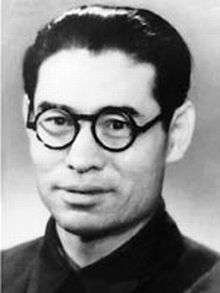
Gao Gang
Gao Gang (Chinese: 高岗; Wade–Giles: Kao Kang; 1905–1954) was a Chinese Communist Party (CCP) leader during the Chinese Civil War and the early years of the People's Republic of China (PRC), before becoming the victim of the first major purge within the CCP since before 1949. The events surrounding Gao's purge, the so-called "Gao Gang Affair", are still the subject of debate: a limited amount of research has been done on the topic, partly due to the relatively small amount of information available.
Born in rural Shaanxi province in 1905, Gao Gang joined the CCP in 1926 and led a revolutionary guerrilla base there during the Chinese Civil War. He was of peasant background with a low level of education: he is said to have not been very literate. Among his colleagues inside the CCP, he gained a reputation as having great confidence and ambition, and of being a notorious womanizer. Trusted by Mao Zedong, Gao was dramatically promoted in the final years of the civil war to become the Party, state and military head of the key Northeast area of China. In 1952 he was ordered to Beijing to become head of the State Planning Commission of China (SPC), where he later attempted a leadership challenge against Liu Shaoqi and Zhou Enlai. His attempt failed and he committed suicide in August 1954.

Gao
Gao /ɡaʊ/ is a city in Mali and the capital of the Gao Region. The city is located on the River Niger, 320 km (200 mi) east-southeast of Timbuktu on the left bank at the junction with the Tilemsi valley.
For much of its history Gao was an important commercial centre involved in the trans-Saharan trade. In the 9th century external Arabic writers described Gao as an important regional power and by the end of the 10th century the local ruler was said to be a Muslim. Towards the end of the 13th century Gao became part of the Mali Empire, but in first half of the 15th century the town regained its independence and with the conquests of Sonni Ali (ruled 1464–1492) it became the capital of the Songhai Empire. The Empire collapsed after the Moroccan invasion in 1591 and the invaders chose to make Timbuktu their capital. By the time of Heinrich Barth's visit in 1854, Gao had declined to become an impoverished village with 300 huts constructed from matting. In 2009, the urban commune had a population of 86,633.
Gao (disambiguation)
Gao is a city in Mali and the capital of Gao Region.
Gao or GAO may also refer to:
Places
- Gao Cercle, an administrative subdivision of Gao Region
Languages
Battles
Other uses

Gao–Guenie meteorite
Gao–Guenie is a H5 ordinary chondrite meteorite fell on in 1960 in Burkina Faso, Africa. The fall was composed by a large number of fragments and it is one of the largest observed meteorite showers in Africa to date.
Name
The meteorites formerly known as Gao and Guenie in 1999 were officially paired and they name fused into the collective name Gao–Guenie.
History
Gao–Guenie meteorites fell in Burkina Faso on March 5, 1960 at 17:00 (local time). After three separate detonations, several thousands of stones rained down over an area of about 70 square kilometres (27 sq mi). The sound of the fall was heard as far as Ouagadougou, which is 100 kilometres (62 mi) away. Eyewitnesses said that some trees were broken and henhouses destroyed. The largest stones recovered weigh up to 10 kilograms (22 lb).
Composition and classification
Gao–Guenie is classified as H5 ordinary chondrite.

Surface details of a small oriented fragment
Surface details of a small oriented fragment

308 g sample
Podcasts:

